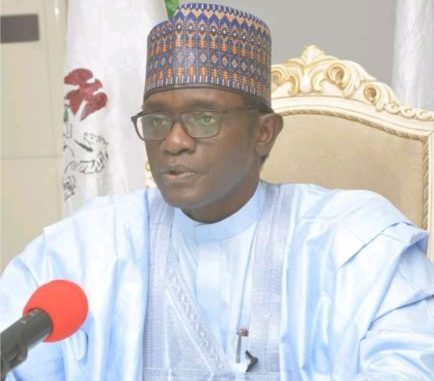Four hundred and seventy-one people died in Yobe State in the last three weeks, the state task force on COVID-19 made the revelation on Tuesday.
The Yobe State Commissioner for Health, Dr. Muhammad Lawan Gana, who is also the vice-chairman of the state committee on COVID-19, said those that died were mostly elderly people.
He added that the total of 471 was put together between the last week of April and the second week of May.
- ‘COVID-19 responsible for mass deaths in Kano’
- Govt, residents disagree over reported death of 300 in Azare
According to the commissioner, the casualties were recorded in Potiskum, which is the business capital of Yobe State, Nguru, Gashu’a and Damaturu the state capital.
Like in Kano, Jigawa, Bauchi and Borno, there has been an outcry across Yobe State over an increased number of deaths through various illnesses.
Though some locals, medical experts and opinion moulders have over the past weeks insisted that most of the deaths being recorded in the northwest and northeast could be attributed to the ravaging COVID-19, in most cases, government officials attributed the development to other factors such as malaria, heatwave and hypertension and ruled out the possibility of coronavirus.
Yobe State shares an international boundary with the Republic of Niger to the North, Jigawa and Bauchi States to the West, Borno State to the East as well as Gombe and Borno to the South.
The media had reported that between the second week of April and early May, over 200 people died in Kano, over 100 in Hadejia LGA of Jigawa and over 150 in Bauchi.
Yobe’s verbal autopsy uncovers scary figures
In Yobe, the response team constituted by Governor Mai Mala Buni to investigate the cause(s) of the mysterious death said on Tuesday that over 90 per cent of the fatalities reported in the state recently had no multiple symptoms with the case definition of COVID-19.
Health Commissioner, Gana while unveiling the preliminary findings of verbal autopsy committee at a media briefing in Damaturu said they conducted their investigations in four frontline local government areas that recorded high numbers.
According to him, “57 per cent of the total deaths had an underlying chronic illness, which include fever, hypertension, diabetes, renal disease, maternal mortality and accident victims,” saying their ages start from 50 years and the majority of them were males.
“Sixteen of the 471 deceased relatives revealed someone with similar symptoms, and all were investigated and referred to a facility, while three out of the 16 met case definition of COVID-19,” he said.
The commissioner further explained that contacts were traced and placed on self -isolation while their sample were taken and are currently waiting for results.
Locals give different perspective
Some people in the local government areas that recorded a high number of deaths said the figure given by the COVID-19 task force was underestimated, saying “dozens of people” had died and thereafter buried.
“Some people believe they don’t have to tell anybody that they lost someone; or tell about the circumstances surrounding the incident,” said Ali Mohammed, a resident of Potiskum.
“Religion and cultural beliefs are key to the disposition of some people when it comes to life and death,” he said.
A medical doctor who does not want his name mentioned said authorities should go beyond verbal autopsy.
“Verbal autopsy is simply a product of an interaction between families of the deceased and officials and this will not give you the actual thing you are looking for.
“I want the governors in northern Nigeria to come up with a framework that will help them unravel the mystery instead of just saying malaria…Honestly, it could be COVID-19.
“And when we look at the trend, Kano, Jigawa, Yobe and Bauchi have something in common – their people relate closely by attending weekly markets across the states and travelling together in open trucks for hundreds of kilometres.
“In Potiskum for instance, you have the largest cattle market located in the town, which makes it the major supplier of livestock in the country.
“You also have the Ngalda market where tons of grains are sold every week and you see people from all walks of life patronising these places.
“If you put this side-by-side with the circumstances of the deaths being recorded in these state, it is easy to find a common ground.
“Of course, someone will say it is mostly the younger people that go to the market but it is the old people that die…
“We should not deceive ourselves, because if you look at the statistics in other climes, you will see that it is also the elderly that were dying more than the young people and officials are not hiding the fact, they tell the world that it is COVID-19,” he said.

 Join Daily Trust WhatsApp Community For Quick Access To News and Happenings Around You.
Join Daily Trust WhatsApp Community For Quick Access To News and Happenings Around You.


